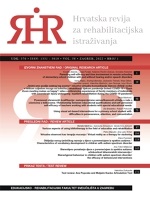„Sretni smo poslije svakog tog zooma“: iskustvo virtualne komunikacije članova obitelji osoba s teškom ozljedom mozga na bolničkoj rehabilitaciji tijekom pandemije bolesti COVID-19
"Each Zoom meeting makes us happy": video conferencing experiences of family members of individuals with severe brain injury undergoing inpatient rehabilitation during the COVID-19 pandemic
Author(s): Ivana Klepo, Andreja Bartolac, Dubravko TršinskiSubject(s): Health and medicine and law, Family and social welfare, Welfare services, Distance learning / e-learning
Published by: Sveučilište u Zagrebu, Edukacijsko-rehabilitacijski fakultet
Keywords: brain injury; inpatient rehabilitation; family resilience; COVID-19; video conferencing;
Summary/Abstract: Family involvement is recognised as an important part of the rehabilitation process for individuals suffering from brain injuries. However, in an attempt to prevent the spread of COVID-19, healthcare institutions were obligated to implement visitor restrictions. The aim of this study was to understand the experiences of family members with respect to communication based on video calls with their close relatives who were suffering from brain injuries and undergoing inpatient rehabilitation during the pandemic. We included a purposive sample of 11 participants/family members who communicated consistently with their loved ones via video conferencing as part of the occupational therapy intervention. Qualitative data was collected using a semi-structured interview. Two independent researchers performed a thematic analysis based on the data inquiry method and highlighted three main themes: (1) coping with a traumatic brain injury of a family member, (2) video conferencing experiences with a family member during rehabilitation, and (3) family resilience factors. Our study highlighted that there were changes in the daily lives of the family, as well as that family members had a strong emotional response due to the traumatic event and the inability to stay with the affected individuals in the hospital. Interactions via video conferencing proved to be significant for the participants since it provided them with an insight into the health condition of their family members, enabled their involvement in the rehabilitation process, and allowed them to monitor the recovery process. The above-mentioned factors also contributed to the resilience of participants. Our findings indicate the benefits of virtual communication and involving family members in the rehabilitation process, especially in situations where hospital visitation is impossible.
Journal: Hrvatska revija za rehabilitacijska istraživanja
- Issue Year: 58/2022
- Issue No: 1
- Page Range: 19-49
- Page Count: 31
- Language: English, Croatian

